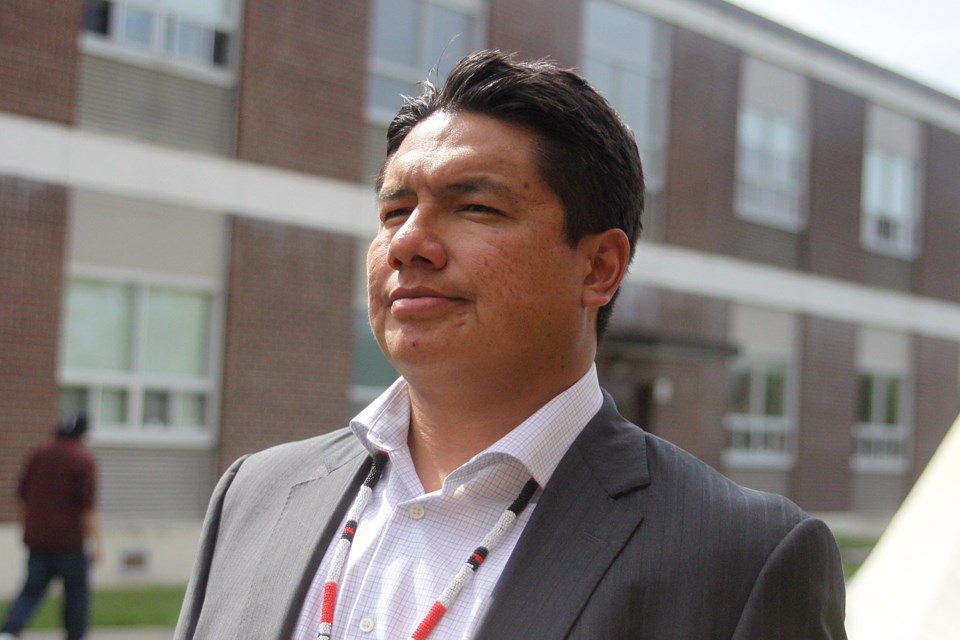THUNDER BAY – In just eight weeks, students from across Northwestern Ontario will be getting ready to start their next school year.
But following the deaths of two Indigenous teens in Thunder Bay earlier this year, concerns have been escalating about sending youth to the city from remote First Nations communities to attend school.
Nishnawbe Aski Nation Deputy Grand Chief Derek Fox said there have to be solutions found for the sake of the children coming to Thunder Bay, as a two-day emergency chiefs meeting on education to address student safety was convened at Dennis Franklin Cromarty High School on Wednesday.
“In my heart, if we stick with the status quo, if nothing is done and we continue to pretend that nothing is wrong in the city, we’re going to continue to lose lives,” Fox said.
The safety of Indigenous youth in the city – particularly those coming for school from communities hundreds of kilometres away – has been an issue for the past two decades.
Seven students died between 2000 and 2011 while attending high school in Thunder Bay away from their home communities, with those deaths examined by a coroner’s inquest that produced 145 recommendations. As well, 20-year-old Daniel Levac, a Dennis Franklin Cromarty High School student from Sachigo Lake First Nation, was fatally stabbed on the front steps of the city’s movie theatre in October 2014.
Most recently, the bodies of two Indigenous teens – 17-year-old Tammy Keeash from North Caribou Lake First Nation and 14-year-old Josiah Begg from Kitchenuhmaykoosib Inninuwug – were found in Thunder Bay waterways in May with the two having been reportedly last seen on the same night.
Those deaths have raised the possibility of youth not coming to Thunder Bay in September, with parents and community leaders wanting the children to stay in their home communities or go elsewhere. Some students enrolled in post-secondary programs have indicated a desire to stay home because of fears for their safety.
Fox acknowledged those concerns but said there is no clear alternative for the students who would be attending Dennis Franklin Cromarty High School if they were to not come to Thunder Bay.
“It would have a huge impact. I don’t know where they would go,” Fox said. “I’m not sure Sioux Lookout has the capacity to hold them, or Timmins, Dryden or Kenora. I don’t know the answer to that. I don’t know if they have the housing and the school capacity to host more students. If they don’t come to Thunder Bay, what are the options?”
Jeremy Monias, from Sandy Lake First Nation and a member of NAN’s All Young People’s Council, remembered feeling lonely when he first moved to the city for education.
The 28-year-old admitted there are times he doesn’t feel safe in Thunder Bay and said the students who are 10 to 15 years younger than him need more supports at an earlier age for adapting to coming to the city.
“It’s like a world opening up to them. I think we can be better prepared by teaching them in the lower grades like 5, 6 and 7,” Monias said.
“We need to prepare them for what to expect and what the outcomes are of coming to school. When I was coming to school I didn’t have any briefings of what to expect here. It was just all brand new to me.”
Valerie Ooshag, a 20-year-old member of the youth council from Fort Hope First Nation who grew up in Thunder Bay, said there needs to be security for all students, particularly the younger ones.
“It’s important they want their education but is it really safe for our people, our young people?” Ooshag said. “Especially the ones that are 13, 14 coming to high school. They’re new to this kind of world and they’re not used to the city life. I think it would be important to show them there are resources and safe spots.”
Several chiefs urged for a discussion about the state of policing in Thunder Bay, which Grand Chief Alvin Fiddler had previously labelled a crisis after expressing concerns about the thoroughness of investigations into Indigenous missing persons and death cases. Those calls led to a confidential, closed door session on Wednesday.
The agenda also included presentations from education providers such as the Northern Nishnawbe Education Council and Matawa Learning Centre, along with representatives from provincial and federal government ministries.
Fox said more can be done at the city level to make the students feel like part of the community.
“We can work together to ensuring that our students are more involved in the community playing sports or volunteering, getting jobs and working with businesses,” Fox said. “I think right now some of our students are operating in silos and are off on their own and feel secluded from the community of Thunder Bay.”
No matter what the chiefs meeting decides, Fox believes the students’ desire for schooling will remain.
“What I know of our youth is that they’re hungry for an education. They want to achieve. They want to succeed,” Fox said.
“They want to be lawyers and doctors and engineers. They want to make a life for themselves. They’re going to get that education wherever they have to go. Some of them, if it’s against their leadership or their parents, they’re going to take initiative.”
